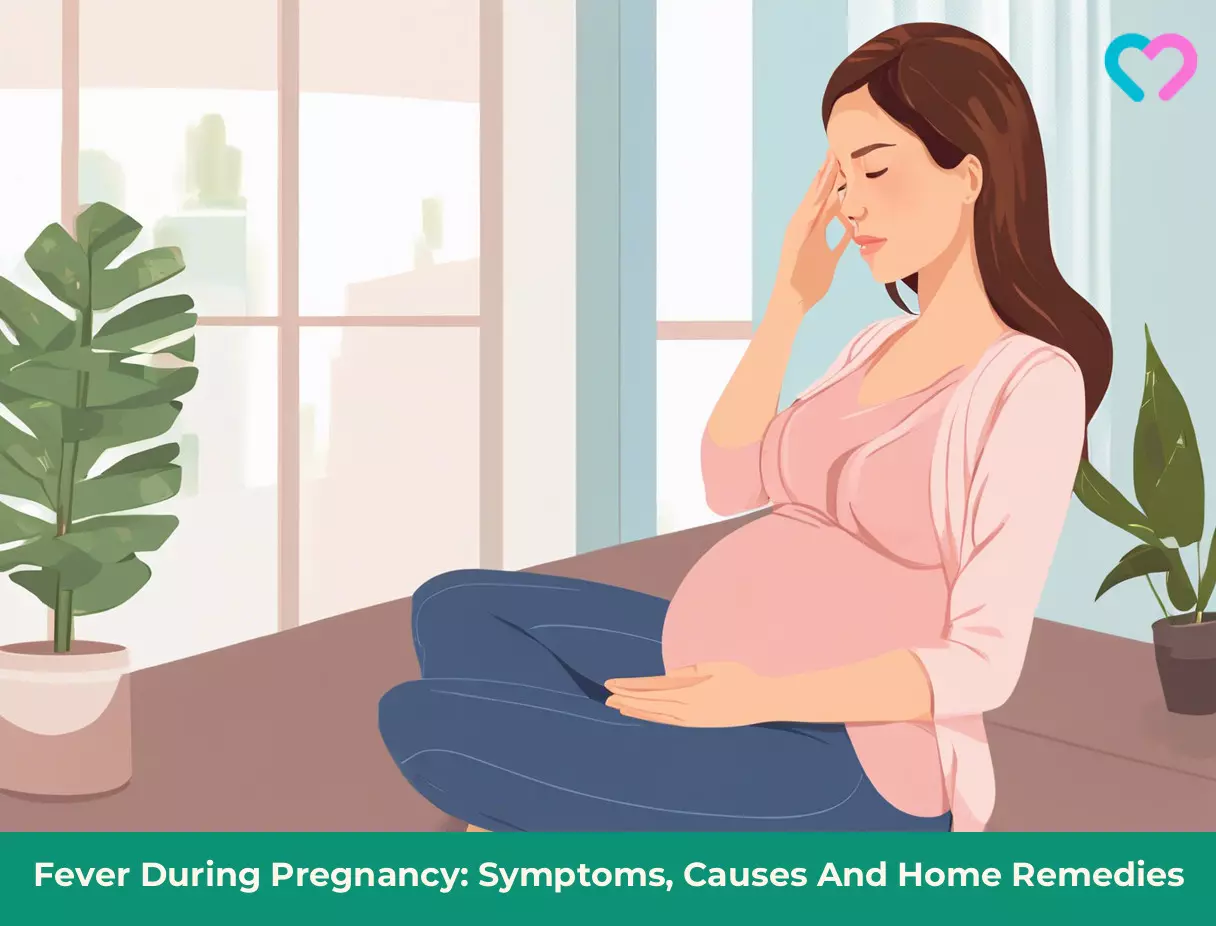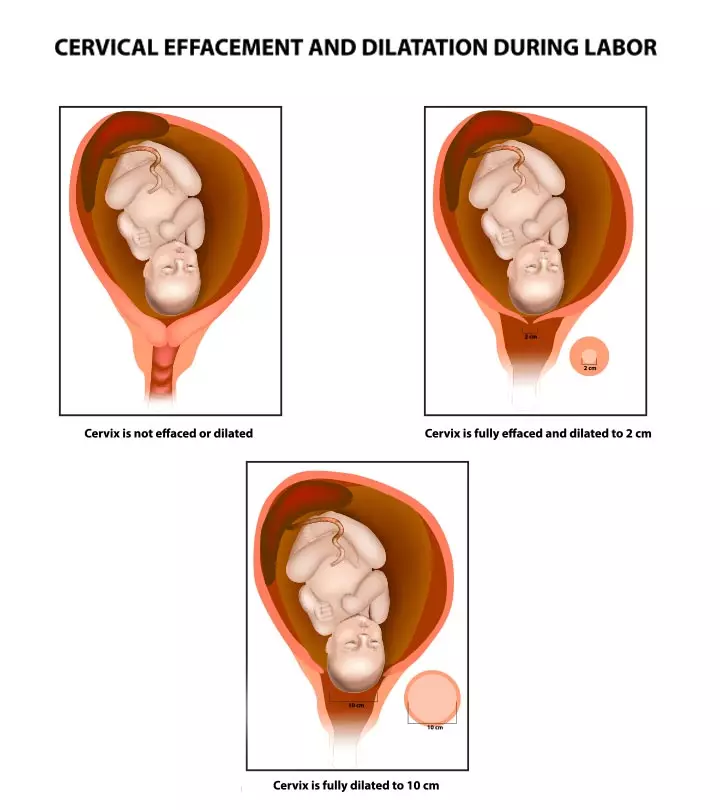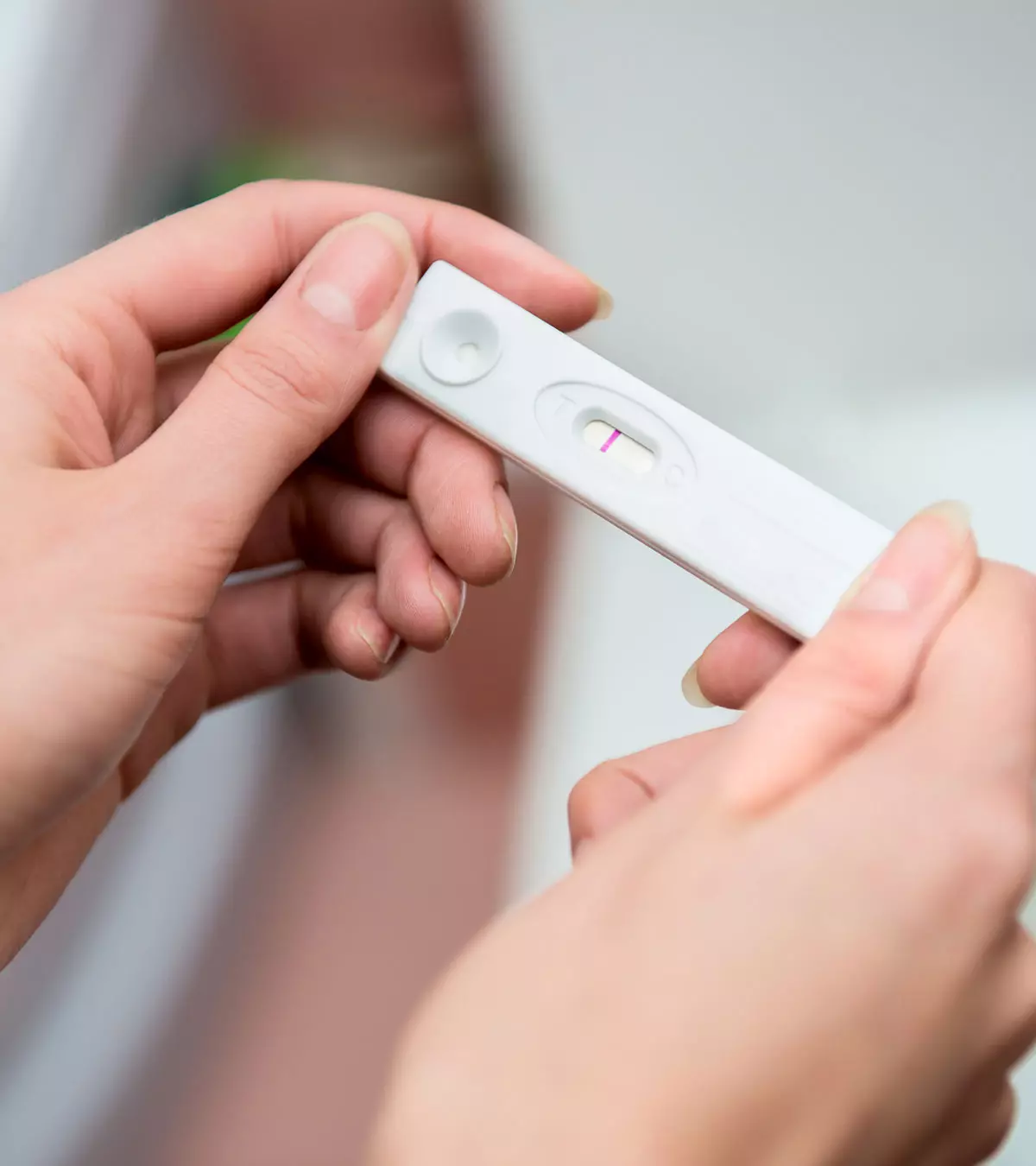
Image: Shutterstock
A fever during pregnancy may occur in any trimester and may not usually cause any problems. However, high temperature along with other signs of illness may raise concerns for fetal and maternal health. In such cases, timely treatment is essential to avoid potential complications, including congenital malformations and even a miscarriage. Thankfully, most expecting mothers may usually recover with timely treatment with no adverse effect on fetal development.

Read on to know more about fever during pregnancy, its causes, and the signs to note.
Key Pointers
- A temperature above 100.4°F (38°C) is considered a fever during pregnancy.
- A high fever with other symptoms may be concerning for maternal and fetal health.
- Fevers during pregnancy can be caused by common colds, UTIs, flu, and other infections.
- Untreated high-grade fever can cause neural tube defects, heart issues, and oral cleft in babies.
- Hydration, ample rest, nutritious food, sponge baths, and acetaminophen may help relieve fever symptoms.
- To prevent infections during pregnancy, avoid outside food, unpasteurized dairy products, and get proper vaccinations.
What Is Considered A Fever During Pregnancy?
A fever is a temporary increase in body temperature. It is not a disease but is a symptom of an underlying illness. The normal body temperature of a human is 98.6°F (37°C). If the temperature increases above 100.4°F (38°C), it is a fever (1).
 Quick fact
Quick factWhat Can Cause A Fever During Pregnancy?
Most causes of fevers during pregnancy are the same as those during any other period of life. However, the maternal immune response is weaker during pregnancy due to the dual load of protecting the mother and the fetus. This makes a pregnant woman more susceptible to regular infections that can cause fever in pregnancy.
- Common cold: The common cold is caused mostly by viruses that affect the respiratory system. A cold is a mild infection that may last for a week. The common symptoms include fever, runny or blocked nose, sore throat, cough, and sneezing. Since it is a sign of viral infection, consult your healthcare provider within 48 hours after the onset of symptoms (2).
- Urinary tract infections (UTIs): Nearly 8% of all pregnant women experience a UTI during pregnancy (3). A UTI occurs when the causative organism (mostly bacteria) travels to the bladder, usually through the urethra. The signs of UTI include a stinging sensation while passing urine, an uncontrollable urge to urinate, incontinence in peeing, and smelly, bloody, or foul-smelling urine (4).
- Chorioamnionitis: It is a condition in which the amniotic fluid (surrounding the fetus) gets infected with bacteria. It usually follows a UTI. A tender uterus, excessive sweat, increased heart rate, foul-smelling vaginal discharge, and fever are the signs of chorioamnionitis (5).
- Influenza: The compromised immunity puts pregnant women and the fetus at risk of influenza. A fever accompanied by chills, body aches, fatigue, runny or stuffy nose, headache, sore throat, diarrhea, or vomiting could be due to the flu (6). Getting a flu vaccine during pregnancy is recommended to help reduce the risk of influenza and its associated symptoms.
 Research finds
Research finds
- Listeriosis: It is a severe food-borne infection that may cause irreversible fetal complications. Fortunately, it is a rare illness in most parts of the world due to better regulation by food regulatory bodies to prevent food contamination (7). The symptoms may appear up to two months after the infection. Diarrhea, upset stomach, fever with chills, stiff neck, loss of balance, confusion, and headache are a few symptoms of listeriosis (8).
- COVID-19: Pregnant women are at an increased risk of becoming severely ill on catching the novel coronavirus. The disease may remain asymptomatic in a few; hence caution is advised if you have come in contact with an affected individual. COVID-19 manifests itself through the regular flu-like symptoms (9).
- Fifth disease: The fifth disease is caused by parvovirus B19 and seldom occurs in adults. The illness may be asymptomatic in a few and cause a rash on the face, joint pains, diarrhea, red eyes, runny nose, swollen glands, diarrhea, fever, or headache in others (10).
Tonsillitis is another infection that causes sore throat, fever, and swollen tonsils. Although it is more common in children and adolescents, it may also occur during pregnancy (11).
A mother and blogger who goes by the name ‘CuteRabbit Land, shares her experience of getting fever and tonsillitis when she was six months pregnant. She writes, “I was having a high fever and sore throat… Of course, I didn’t dare to take any medicine as I was in my 6th month of pregnancy… To get better, as usual, I hid under a thick quilt without an air con and drank lots of warm water. My mother-in-law (MIL) started to get worried and boiled barley and Liang desserts for me. However, it didn’t work (i).” Later, she was admitted to the hospital for treatment, where tonsilitis was diagnosed and was given relevant treatment.
How Can Fever Affect Pregnancy?
Since fever indicates an underlying illness, its effect on pregnancy is mainly dependent on the cause. A high-grade fever, if unattended, might be fatal to the baby. Fever and infections during pregnancy may lead to the following complications in the baby.
- Cardiovascular malformations: A fever during the first trimester of pregnancy increases the chances of a congenital heart defect (12).
- Miscarriage: Fever and bacterial infections during pregnancy could cause miscarriages in some cases (13).
- Neural tube defects: Women who develop a fever during the early stages of pregnancy are more likely to have babies with neural tube defects. This is because the neural tube forms during the first few weeks of pregnancy. Folic acid intake may reduce the incidence in such cases (14).

- Oral cleft: There is strong evidence that fever in pregnancies could cause oral clefts in babies (15).
Running a fever early in pregnancy may usually cause more harm to the baby (14). Therefore, the intake of antipyretics (pills that reduce the body temperature) during this phase could be helpful. Consult your doctor before taking any medications during pregnancy.
Pregnant women, listen up! According to a study, having flu and fever for a longer duration during pregnancy may be linked to autism in children. Learn more in this video.
Is Fever A Sign Of Pregnancy?
Fever is not a sign of pregnancy. Hot flashes and feeling warm are common complaints in pregnant women, but it is not to be confused with fever. The best way to confirm pregnancy is to do a home pregnancy test followed by a visit to your doctor.
How To Reduce Fever With Natural Remedies?
Here are a few natural home remedies to cool the body during a fever in pregnancy.
- Stay hydrated: Drink plenty of fluids, such as fresh homemade juices and coconut water, to help the body manage the fever better. You may also drink warm water if you have a fever with congestion.
- Dress comfortably: Wear loose clothing made from light and breathable fabrics. It will provide adequate ventilation to your body.
- Rest well: Exhaustion often accompanies fever; hence rest well. Good rest helps in recouping the body’s strength.
- Stay in a cool area: Stay in a cool and well-ventilated room. Avoid using an air conditioner as it may make you feel cold. Instead, keep the room airy with the help of a table or ceiling fan.
- Gargle: If you have the flu, gargling with warm salty water could feel soothing to the irritated throat. It may also make you feel better and make it easier to tolerate the fever.
- Eat healthily: Consume foods with immune-boosting power. Eat a hygienically prepared, balanced diet. Have small frequent meals instead of eating large portions at once.

- Sponge the body: Soak a washcloth in water at room temperature and place it on your forehead. You may also rub the wet washcloth on your hands and legs. This can help reduce the body temperature through water evaporation.
What Are The Medications Prescribed?
Your doctor may prescribe pregnancy-safe medications, such as acetaminophen (paracetamol), to reduce the body temperature. The doctor may also prescribe other medicines, such as antibiotics, to treat the underlying cause of fever. Women with fever in the third trimester may be given non-steroidal anti-inflammatory drugs (NSAID) such as Ibuprofen. Do not self-medicate, and only have medicines if prescribed by the doctor. Always check the expiration date of the medicine before having in the third trimester may be given non-steroidal anti-inflammatory drugs (NSAID) such as Ibuprofen, but not after week 34 of gestation (2).
 Caution
CautionHow To Prevent Fever During Pregnancy?
You may prevent fever during pregnancy through some precautions and preventive measures. Most of these measures involve avoiding pathogens and infections that lead to fever in the first place.
- Wash your hands frequently with a hand wash.
- Get your vaccinations against seasonal flu and H1N1 influenza on time.

- Maintain distance from ill people.
- Avoid eating foods outside.
- Eat hygienically prepared homemade food.
- Avoid consuming unpasteurized milk. Purchase food products approved by food regulatory bodies.
- Do not visit hot tubs, saunas, or tanning beds that increase your body temperature and may cause a temporary fever.
When To Call A Doctor?

Call your doctor if your body temperature rises above normal. You must also see a doctor if you experience the following.
- Shortness of breath
- Diarrhea or vomiting
- Persistent cough
- Back or abdominal pain
- Chest pain
- Vaginal bleeding
- Dizziness or blurred vision
Frequently Asked Questions
1. Does fever in pregnancy increase the risk of autism, attention deficits, or developmental delays in my baby?
A fever during pregnancy may cause neurodevelopmental delays in babies, especially during the early stages. These disorders may include autism spectrum disorder and developmental delays. It does pose a risk factor and hence requires medical attention (16) (17).
2. How long can a fever last during pregnancy?
Fever in pregnancy lasts as long as the underlying maternal infection does. Therefore, consult your doctor to examine the cause and resolve the fever sooner.
3. Is it common to get a fever while pregnant?
The exact prevalence of fever during pregnancy is unknown, as many cases may go unreported. Irrespective of its occurrence, you must consult a doctor if you notice fever during pregnancy since an increased body temperature could influence the fetus’ health.
If you develop a fever when pregnant, do not panic. Mild fever with no debilitating symptoms seldom causes any problems to you or your baby. Nevertheless, it is always good to consult the doctor, and it is even more essential if you have other severe symptoms. Timely diagnosis of the underlying cause can help resolve fever early, preventing the risk of potential complications in the baby.
Infographic: Easy Recipes To Boost Immunity And Manage Fever During Pregnancy
The uncomfortable fever symptoms can add to the pregnancy’s tiredness and overwhelming changes. So you need to strengthen your body by eating healthily. This infographic provides recipes for some delicious preparations to fight the fever and recover sooner.
Some thing wrong with infographic shortcode. please verify shortcode syntax
Illustration: Fever During Pregnancy: Symptoms Causes And Home Remedies

Image: Stable Diffusion/MomJunction Design Team
Personal Experience: Source
MomJunction articles include first-hand experiences to provide you with better insights through real-life narratives. Here are the sources of personal accounts referenced in this article.
i. Fever and tonsillitis during my 6th month pregnancy. https://cuterabbitland.blogspot.com/2014/06/fever-and-tonsillitis-during-my-6th.htmlReferences
- Fever.
https://my.clevelandclinic.org/health/symptoms/10880-fever - Cold And Flu During Pregnancy.
https://www.pregnancybirthbaby.org.au/cold-and-flu-during-pregnancy - Urinary Tract Infections During Pregnancy.
https://www.aafp.org/pubs/afp/issues/2000/0201/p713.html - Urinary Tract Infections (Uti’s) In Pregnancy.
https://www.pregnancybirthbaby.org.au/urinary-tract-infections-utis-during-pregnancy - Chorioamnionitis.
https://my.clevelandclinic.org/health/diseases/12309-chorioamnionitis - Influenza (flu) And Pregnancy.
https://www.marchofdimes.org/find-support/topics/pregnancy/influenza-flu-and-pregnancy - Vanitha Janakirama; (2008); Listeriosis In Pregnancy: Diagnosis, Treatment, And Prevention.
https://www.ncbi.nlm.nih.gov/pmc/articles/PMC2621056/ - Listeria And Pregnancy.
https://www.acog.org/womens-health/faqs/listeria-and-pregnancy - Coronavirus Infection And Pregnancy.
https://www.rcog.org.uk/guidance/coronavirus-covid-19-pregnancy-and-women-s-health/coronavirus-covid-19-infection-in-pregnancy/ - Fifth Disease And Pregnancy.
https://www.marchofdimes.org/find-support - Tonsillitis.
https://my.clevelandclinic.org/health/diseases/21146-tonsillitis - Lorenzo D. Botto, et al.; (2014); Congenital Heart Defects After Maternal Fever.
https://www.ajog.org/article/S0002-9378(13)01990-X/fulltext - C. Egloff, et al.; (2025); Causes And Consequences Of Fever During Pregnancy: A Retrospective Study In A Gynaecological Emergency Department
https://www.ncbi.nlm.nih.gov/pmc/articles/PMC7444605/ - Can having a fever while pregnant hurt my baby?
https://www.marchofdimes.org/find-support/blog/can-having-fever-while-pregnant-hurt-my-baby - Dorothy Kim Waller, et al.; (2017); Maternal Report Of Fever From Cold Or Flu During Early Pregnancy And The Risk For Noncardiac Birth Defects, National Birth Defects Prevention Study, 1997–2011.
https://www.ncbi.nlm.nih.gov/pmc/articles/PMC5831519/ - Ousseny Zerbo, et al.; (2013); Is Maternal Influenza Or Fever During Pregnancy Associated With Autism Or Developmental Delays? Results From The Charge (Childhood Autism Risks From Genetics And Environment) Study.
https://www.ncbi.nlm.nih.gov/pmc/articles/PMC3484245/ - Sevi Giakoumelou, et al.; (2015); The Role Of Infection In Miscarriage.
https://www.ncbi.nlm.nih.gov/pmc/articles/PMC4664130/ - Flu & Pregnancy.
https://www.cdc.gov/flu/highrisk/pregnant.htm#anchor_1565116373 - FDA Warns that Using a Type of Pain and Fever Medication in the Second Half of Pregnancy Could Lead to Complications.
https://www.fda.gov/news-events/press-announcements/fda-warns-using-type-pain-and-fever-medication-second-half-pregnancy-could-lead-complications
Community Experiences
Join the conversation and become a part of our nurturing community! Share your stories, experiences, and insights to connect with fellow parents.
Read full bio of Dr. Karla S. Sanchez-Banos
Read full bio of Sindusha MS
Read full bio of Rebecca Malachi
Read full bio of Reshmi Das

















